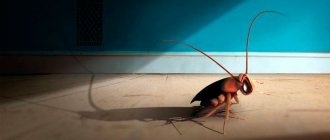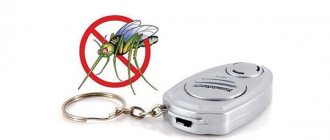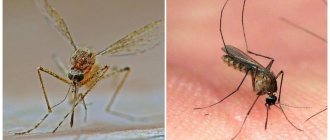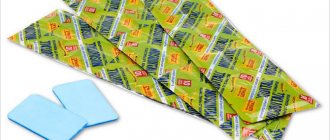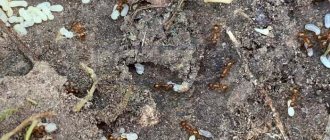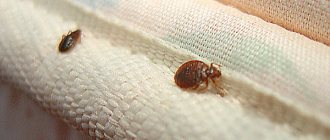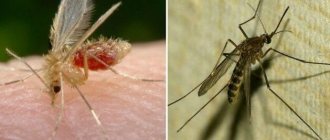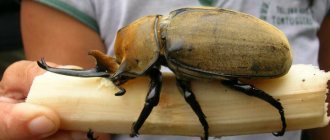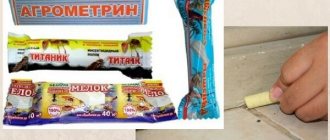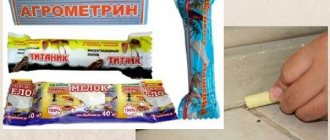Mosquitoes are annoying pests that not only irritate you with their buzzing, but also with their painful, itchy bites. Unfortunately, it is almost impossible to completely protect yourself from interaction with these insects. They are especially active in the autumn and summer, also in the spring - in the warm months, after the snow has melted and solar activity has increased. It’s difficult both in cities and outside of them.
Despite such an unpleasant neighborhood and a high probability of bites, it is still possible to reduce the risks.
For this, traditional methods are used. They are simple, cheap and do not pose any danger to humans. You can resort to the help of professional chemicals. They are effective and also safe for humans. Get rid of mosquitoes in your country house
Get rid of mosquitoes in your country house
Hit from the USA. A guaranteed way to destroy all mosquitoes on the site.
skeetervac.ru
Open ›
Next, we will look at what mosquitoes are afraid of and how to repel them.
What blood type do mosquitoes choose?
It is known that only female mosquitoes feed on the blood of people and animals. They do this not so much for their own pleasure, but for procreation. The blood contains protein necessary for the development of insect embryos. Males prefer a diet that is harmless from a human point of view: plant nectar.
Of course, distinguishing who is flying past - he or she - is problematic, so the population fights mosquitoes not selectively, but massively and radically. It is believed that those with blood group 1 have to do this more often than others. Carriers of groups 3 and 4 are less susceptible to bites from annoying insects. Why this is so - one can only guess about mosquito “tastes”. Probably, insects do not like special proteins - agglutinogens, which are present in red blood cells of groups 2,3,4, but are not present in group 1.
Attention! The dependence of the frequency of mosquito bites on blood type - conclusions drawn from observations of ordinary people. There are no serious studies on the topic yet. But on various forums you can find many refutations of the fact that owners of groups 3 or 4 are bitten less often by mosquitoes.
Why does it work on some and not on others?
Lavender is considered a good honey plant. Bees, butterflies, and bumblebees are attracted by the sweet pollen of purple inflorescences. So why don't other insects like lavender? Why does she repulse them so much?
Ticks, mosquitoes, bedbugs, fleas, and lice feed on the blood of humans and animals. Moths and microscopic mites feed and raise offspring on dead scales of skin epithelium, wool, and fur. These insects and arachnids have well-developed olfactory receptors. They find their food (humans, warm-blooded animals) by the specific organic smell of a living body.
If you smear a person, a dog, or a cat with lavender extract, then its essential components will temporarily kill the “native” smell . The parasite, not sensing bodily fluids, will believe that it will not find food in this place. The bloodsucker will not waste energy on an object that is obviously unpromising in terms of feeding; it will look for another one.
The effect of lavender on blood-sucking and synanthropic pests lies in deceiving the receptors. The warm-blooded object temporarily falls out of their sphere of attention. The period of action of lavender essential substances lasts no more than an hour. Odorous plant substances are washed off fairly quickly afterwards.
Ants and mites that eat plants avoid areas planted with lavender. They are repelled by terpene compounds in the stems and leaves of the plant. Terpenes are poisonous to insects; they do not bite such plants - they are not tasty . Therefore, they crawl to another garden, where the plantings are more edible.
What else attracts blood-sucking insects?
Without confirming the sympathy of female mosquitoes for a certain blood type, scientists note: there are other factors that are more likely to influence the “favor” of insects:
- age of the person – young people are bitten more often than older people;
- hemoglobin level – a person with anemia is less likely to be liked by a mosquito;
- blood composition - mosquitoes are attracted to people who have a lot of B vitamins in their bodies.
Mosquitoes may be attracted to the dark colors of your clothes
Also, blood-sucking insects willingly flock to:
- The smell of sweat. The component that annoying mosquitoes like most about it is lactic acid, which is released by muscles when moving.
- Alcoholic amber.
- Hair balm scent.
- The smell of certain medications, such as heart medications.
There is a high chance of being bitten by a person with a high body temperature (from illness or intense movement), as well as by pregnant women. During pregnancy, women exhale more carbon dioxide, which attracts insects.
Advice. Remember that mosquitoes can see colors. Most willingly, they flock to a “victim” dressed in an outfit of red, black and dark blue tones. Their least favorite color is yellow.
How do bedbugs breathe?
Bedbugs do not have lungs, but nevertheless they require oxygen to survive, albeit in very small quantities. Insects breathe through a special system of tubes branched throughout the body - tracheas. The exits of the trachea to the outside, where air is captured from the outside, are located on the abdomen of the insect. Thus, the mouth of a bedbug is a completely separate system of the body, which is in no way connected with its breathing, and the pest does not have a nose in principle.
How do bedbugs smell?
The perception of odors in bedbugs occurs not through the respiratory system, but through the olfactory sensilla. They look like microscopic hairs that cover the antennae and some areas of the insect's head. Decoding impulses, on the contrary, occurs in exactly the same way as in mammals. The sensilla contact odor molecules and send a nerve signal to the brain, where it is deciphered and interpreted.
Interesting fact
Laboratory studies have shown that bedbugs search for people indoors primarily by heat and carbon dioxide emissions. They are able to accurately detect odors from a distance of up to 1 meter. It was also found that bedbugs are attracted to unwashed clothing and bedding, which apparently have human odors on them.
Essential oils that repel mosquitoes
If you do not want or have the opportunity to use a spray or fumigator, use natural remedies to get rid of mosquitoes. It has been proven that these annoying insects cannot tolerate the smell of pine needles and citrus fruits, so stock up on any essential oil from the pharmacy:
- cedar;
- juniper;
- pine;
- spruce;
- cypress;
- lime;
- grapefruit;
- orange;
- lemon.
Also, mosquitoes do not like the oils of cloves, eucalyptus, anise and basil, lavender, tea tree, vanilla and citronella, mint, cinnamon and valerian - the choice is quite wide. When choosing a scent to protect against insects, be guided by your own preferences. Before active use, make sure that you are not allergic to the purchased product.
Any of the aromatic oils can be used in the following ways:
- Add a few drops to the aroma lamp.
- Drop a little onto a candle, into a fireplace or stove, or into a fire outdoors. In short, any fire source will do.
- Mix with water and spray from a spray bottle onto clothes, furniture, and spray the air in the room.
- Place pieces of cotton wool, rags, and sponges soaked in oil throughout the house or in the part of the summer cottage where you relax.
- Add a little aromatic liquid to the baby cream and lubricate exposed skin.
The smell of smoke and pine needles will help repel mosquitoes in nature
Camphor oil is considered a strong and effective means of fighting mosquitoes. However, it is poorly tolerated not only by insects, but also by some people. Keep a few drops of camphor over the fire. If you do not experience any discomfort, evaporate 100 ml of oil over the burner. This amount is capable of driving out “bloodsuckers” even from large houses.
Attention! Mosquitoes tend to avoid people taking medications to lower cholesterol. But there is no evidence that insects bite diabetics especially often due to high levels of glucose in their blood.
What will it help?
Preparations with lavender act on flying, blood-sucking insects and arthropod parasites.
Mosquitoes
Blood-sucking dipterans bother people both on the street and at home . Even a frosty winter is not a hindrance if the house has a warm, damp basement. The ubiquitous bloodsuckers lie in wait near a pond, in a dacha, or in the forest. Only female mosquitoes feed on the blood of warm-blooded animals, obtaining building material for laying eggs.
Mosquitoes spread diseases that are dangerous to humans. The bites of an ordinary “non-infectious” insect also cause discomfort. Children and allergy sufferers suffer especially hard from the consequences of mosquito attacks. In addition to itching, biting can cause a severe reaction with swelling. By scratching the bite site, children often introduce a secondary infection into the wound.
Bedbugs
Bed bugs also feed on our blood .
During the day they hide in secluded dark places in their homes, and at night they go out hunting. They prefer women and children because of their thin, delicate skin, devoid of dense hair. Bed bugs live even in a clean room - a cozy, decent hotel or a tidy apartment. The main thing for bloodsuckers is the presence of a food source, that is, a person.
Damage from bed bugs:
- interfere with proper sleep and rest at night;
- allergies to bites, secondary infection of scratches;
- They spoil furniture, equipment, paintings, books with traces of their life activity.
Europeans used aromatic incense to protect themselves from bedbugs back in the Middle Ages. According to eyewitnesses, it helped, but not for long.
Ants
Ants are associated with hard work and high social organization. They do not cause repulsive emotions or disgust. However, they cause some inconvenience to people:
- aphids are bred on cultivated plants for their own food;
- damage fruits, berries and other parts of garden plantings;
- settle in a person’s home and spoil food.
Ants are sensitive to odors. They communicate using odorants, sensing them with long, thin antennae.
Fleas
They live on wool, feathers, and folds of clothing. They infect humans and animals with bacteria, viruses, and dangerous protozoan parasites. Therefore, preventing flea infestations is extremely important. Fleas reach humans through “street” animals and from basements .
Lice
Blood-sucking parasites are common in crowded conditions where people live in a lack of hygienic conditions. Lice carry infections and cause severe itching, scratching and redness at the bite site. Their vision is poorly developed. Lice navigate and find the victim solely thanks to their excellent sense of smell.
Mole
Clothes moths are ubiquitous. Moth caterpillars feed on natural wool fibers , down, feathers, and wool. They often appear in cereals, thereby spoiling food supplies.
Note ! The smell of lavender will only repel adult moths. Repellents have no effect on caterpillars.
Ticks
Unlike previous pests, they are not insects, but arachnids. There are numerous types of ticks. Ixodid ticks attack people and animals while walking in parks and forests .
Ixodids are blood-sucking parasites that transmit infectious diseases of humans and animals.
Microscopic mites live in upholstered furniture, mattresses and other bedding. House mites cause allergies and dermatitis . Ticks are known to eat agricultural crops and damage crops of useful plants.
What plants can repel annoying mosquitoes?
To protect against mosquitoes, you can use the same plants from which essential oils that repel insects are prepared.
- When relaxing in nature, burn spruce and pine needles and branches in a fire. Smoke by itself is a good repellent to bloodsuckers, but in combination with pine needles it gives a more noticeable effect.
- Grow strong-smelling crops under windows or in flowerpots on the window: lavender; cloves; geranium; chrysanthemum; mint; lemon balm; Persian chamomile; marigold. Decorate rooms, verandas, terraces, gazebos, etc. with bouquets of these flowers.
- Plant tomatoes, garlic and basil, elderberry or bird cherry near the house.
- Place fresh or dried herbs around the apartment: anise; thyme; lemongrass; sagebrush; thyme; wheatgrass Some of them can be purchased in the spice department, others at the pharmacy.
- Peel several citrus fruits (lemon, orange, lime, grapefruit) and place their peels around the perimeter of the room or house.
Attention! Mosquitoes don't like the smell of incense.
Laundry soap, vinegar, ammonia and even Zvezdochka balm will also help protect against blood-sucking insects. But the basic rule of insect control is: mosquitoes cannot stand the smell of cleanliness. Therefore, keep your home in order, ventilate and prevent the appearance of dampness, mold, and disinfect work surfaces. Shower regularly, preferably with soap. The fewer bacteria, the less attractive your body odor will seem to the little “bloodsuckers,” and this will significantly reduce the likelihood of an unpleasant encounter with mosquitoes at home or outdoors.
Folk remedies that repel bloodsuckers
Mosquitoes are most afraid of natural plant scents. It makes sense to use the following plants. And their photos will help you remember what they look like in nature.
Go to website
Sagebrush
A well-known herb with an astringent taste and specific aroma. The best remedy for mosquitoes is wormwood, which can be found in central Russia, Ukraine and almost the entire continent.
Wormwood owes its bitter taste to special substances, essential oils, and terpenes. They have a pungent odor, phytoncidal and insecticidal effect. Insects, including cockroaches, moths, and ants cannot tolerate this aroma.
A good way to scare away uninvited guests is to hang small branches of wormwood in the corners of the room. This is especially true in a private home. In an apartment, you can put dry or fresh shoots of the plant in a vase. Place an improvised repeller on the windowsill, near the balcony door.
Citronella
A tropical herb with a citrus-like aroma. The plant owes its repellent effect on insects to the high content of essential oils and terpenes. Citronella or lemongrass (lemongrass), as it is also called, has a pleasant, refreshing scent that tones and improves mood.
In fresh or dried form, you can place the grass on the windowsill, near the balcony door - places where insects can penetrate.
Mint
Mosquitoes are afraid of the smell of mint, especially mint, which has the strongest aroma. The composition includes natural insecticides and phytoncides: pulegone, menthol and others. It grows in the northern Caucasus of Russia, as well as in the southern regions of the Eurasian continent. It is better to grow outside the apartment, because the smell is too strong. Due to the abundance of essential oils, a headache may begin.
This potted crop is ideal for controlling insects in the house. You can also use cut shoots. Even in dried form they retain their insecticidal properties.
Large stands of pennyroyal or other mint can be used as a natural barrier for mosquitoes to enter a certain area, for example, a gazebo.
Geranium
It has a sharp, unpleasant, specific odor, especially when cut, when juice is released. Considering the peculiarities of mosquito perception, they feel the aroma of this plant even more pronouncedly and are afraid of it.
Geraniums can be planted in a pot on a windowsill. At home, it grows quite quickly and blooms often. Some varieties are suitable for planting outside. Spreading flower beds can be used as a natural barrier for harmful insects. The smell of geranium is not tolerated not only by mosquitoes, but also by flies and horseflies.
Rosemary
Best known as a food additive, seasoning for dishes. But even in its fresh form it can play its role. It is worth planting on the ground. It has a pleasant appearance and contains a large amount of phytoncides, which mosquitoes are afraid of in nature. Some species can be planted at home.
An added benefit is that once the season has passed, dried rosemary can be used in cooking. Like an aromatic spice.
Also popularly used as natural fumigators:
- Marigold. They have a specific and very pungent odor. It repels not only mosquitoes, but also aphids, midges, and midges. Thanks to its interesting appearance and unpretentiousness, it plays a big role in the fight against bloodsuckers on the street.
- Tansy. A plant with a high content of tanacetin, flavonoids, and essential oils. It is best to plant in groups on the site. It will not take root in the house due to its significant size and need for sunlight. Plantings help fight mosquitoes, aphids and other harmful insects.
- Basil. There are dozens of varieties. It is used not only in cooking, but also as an insecticide. You can spread the leaves on the windowsills or grow them in a pot on the plot.
- Lavender. The dried parts of the plant have a delicate aroma. Used as a strong insecticide. Grows best in warm climates. Does not tolerate cold. Therefore, it is better not to take it out onto the street in central Russia.
- Melissa. Has natural repellent properties. If you rub lemon balm oil on your clothes and skin, you won’t be afraid of bites. It is permissible to plant the plant at home, in a pot.
- Elder. Large bushes. There are several varieties that do well in the middle zone. They are planted on the site in small groups. Bushes grow quickly, so from time to time they need to be shortened and trimmed.
At home, freshly cut branches of this plant are used to repel insects. Interestingly, elderberry fights not only bloodsuckers, but also cockroaches, ants and even moths.
Related articles: Ultrasonic repellers
Herbs and spices
With a pungent odor. For humans, the aromas of such folk remedies are pleasant, but for mosquitoes, on the contrary, they are disgusting:
- carnation;
- garlic;
- eucalyptus;
- Bay leaf;
- cinnamon.
This is not a complete list of odors that mosquitoes are afraid of in nature. The list will be completed by coniferous trees, juniper, and the smell of smoke (especially burning alder). These options are the most effective due to their rich natural composition. The listed folk remedies are afraid of malarial and ordinary mosquitoes, centipedes (which are also considered mosquitoes, even if they are not capable of biting).
Household products
Products used in everyday life are also often suitable for the role of fighters against blood-sucking insects. So, mosquitoes cannot stand the smell:
- Stars. The medicinal balm, familiar to many since childhood, contains in its composition the essential oils of most plants that mosquitoes do not like: clove, mint, eucalyptus, cinnamon. Additionally, menthol and camphor leave bloodsuckers no chance.
- Ammonia. Even humans cannot stand the pungent aroma of the concentrated product, let alone the sensitive sense of smell of pests. To prepare a working mosquito repellent solution, 100 ml of ammonia is mixed with 1 liter of water. The composition is sprayed in the room, but care is taken to ensure that children and pregnant women are not in it. Vinegar has a similar effect.
- Laundry soap . The detergent produces an effective solution against bloodsuckers. To prepare it, 100 g of bar soap is grated, mixed with warm water, and allowed to dissolve. The resulting composition is used to treat the home. Instead of laundry soap, tar soap with a similar repellent effect is often used.
Spices
Ordinary spices and seasonings, which are found in almost every kitchen, also help repel mosquitoes from the house. Such repellents will not cope with a massive incursion of bloodsuckers, but they will be able to ward off 1-2 buzzing mosquitoes from the room.
- Vanilla. The smell of natural vanilla in the pods is not liked by mosquitoes, midges, flies and horseflies. Even confectionery vanillin, where the vanilla content is minimal, can effectively ward off bloodsuckers. To prepare a homemade repellent, dissolve 1 sachet of vanillin in 200 ml of warm water, add a vanilla pod or add 6 drops of essential oil.
- Carnation. Mosquitoes are disgusted by the pungent smell of both flowering cloves and the dried buds of the plant in the form of a spice. To prepare an effective mosquito repellent, cut 1 lemon in half and stick clove inflorescences into the pulp. The citrus smell mixes with clove and does not give insects a chance to feast on human blood.
- Cinnamon. The sharp and persistent aroma of the spice spreads over a long distance, allowing you to protect a room of 10-15 sq.m. from bloodsuckers. Cinnamon essential oil also has a repellent effect.
Features of the life of mosquitoes
Nature has endowed blood-sucking insects with an excellent sense of smell. It is with its help that they detect the scent of the prey at very long distances.
Interesting!
The diet of mosquitoes varies. Scientists have proven the fact that females drink blood. Males are vegetarians in their diet and do not even have a mouthparts with which to bite.
Before talking about what smell repels mosquitoes, you need to figure out what attracts them and by what sign the female finds her prey.
Mosquitoes are attracted to:
- Increased concentration of carbon dioxide. It is secreted by humans during breathing, so it is easy for insects to determine the location of their prey.
- Sweat. Especially relevant for stuffy summer nights.
- Warm. Body temperature becomes another clear indicator for female mosquitoes.
A person’s task at home is to choose a substance that will smell stronger than its natural odors. In this case, the mosquito will not be able to get close to the victim. When using very strong aromas, the insect completely loses spatial orientation and goes into chaotic flight.
How to use scents to control bedbugs at home
The source of most odors that repel bedbugs are aromatic oils, however, they can be used at home in different ways.
Sprays
Scented sprays are one of the most popular ways to use essential oils. Typically, up to 20 drops of oil are added to a 0.5-liter bottle of liquid, the mixture is shaken, and then applied through a spray bottle to surfaces, objects and areas where it is necessary to leave a pest-repellent aroma.
You can use not only one specific oil, but also create compositions from several ingredients. For example:
- Water + 10 drops lavender + 6 drops lemongrass + 6 drops tea tree + 10 drops thyme.
- Vodka (0.5 liters) + 15 drops of lavender + 15 drops of eucalyptus + 15 drops of tea tree.
- Alcohol 70% and above (0.5 liters) + lemongrass + cloves + lavender + thyme - only 20 drops each.
Before using any such homemade spray throughout your entire apartment, make sure that the smell is pleasant to you and tolerable to everyone living with you. Surfaces that absorb moisture can be saturated with aromas for a very long time; this is important to consider when using oils in any way.
Direct application to surfaces
Applying essential oils directly to surfaces undiluted is a radical approach that should be used with caution, especially on visible areas and materials that absorb and retain odors. It is most suitable for emergency lubrication of cracks, cracks and hard-to-reach places, although a much more effective measure would be to seal these cracks and cavities during repairs.
Cotton pads with oil
A lightweight version of the previous method. Oil-soaked discs can at least be quickly removed if necessary. This method can be especially effective if you place the disks next to or directly on the battery. The heat will provoke the release of odorous substances and the discs will repel pests not only within a meter radius around them, but also fill the room with the target aroma, increasing the area of influence of the smell.
Solid Incense
You can create a concentrated, rich aroma using incense in solid form, such as sticks. Their assortment includes suitable spicy scents, which can be solo or part of compositions.
Oil burner
Oils in liquid form can be placed in an aroma lamp and left in rooms where a specific scent needs to be diffused.
Helpful advice
When using oils, you don't have to be within their range all the time. An aroma lamp or lit incense can be left indoors for several hours, and then the room can be ventilated. It is important to ensure that an unattended odor source is placed safely and will not cause a fire.
Air humidifier with aroma function
Some humidifier models have an essential oil slot. This way you can simultaneously humidify the room and fill it with the desired aroma.
Bunches of plants
Some plants that contain essential oils that repel bedbugs can be purchased at grocery stores, such as thyme, mint, or cloves. Depending on their shape, they can be laid out in bunches fresh or used to make aromatic sachet pads. Their contents will need to be changed periodically for fresh ones. The more the plant dries out, the less intense its smell becomes.
Planting
Live plants in pots can also help repel bedbugs, especially around window sills. Thyme, lavender, mint and, with proper care, some types of citrus fruits can grow in the apartment.
Advantages and disadvantages of essential oils
Essential oils are often used not only in folk medicine and cosmetology, but also to repel mosquitoes. And they are a worthy competitor to purchased products of a similar effect.
Let's try to understand what their advantages are compared to repellents that can be purchased in stores and pharmacies:
- low cost of the product;
- low consumption of essential oil;
- absolutely natural product;
- most oils have healing properties, so in addition to repelling mosquitoes, such a remedy will also relieve itching and irritation from the bite;
- the smell of some essential oils relieves fatigue, restores the nervous system and has other beneficial properties.
But there are also disadvantages that make essential oils less effective compared to chemical repellents:
- the oil disappears quickly: on average, the ether lasts for 2–2.5 hours, after which it needs to be renewed;
- not all extracts are effective against mosquitoes;
- some oils cause burns when applied to the skin in their pure form;
- Individual intolerance to the drug is possible.
